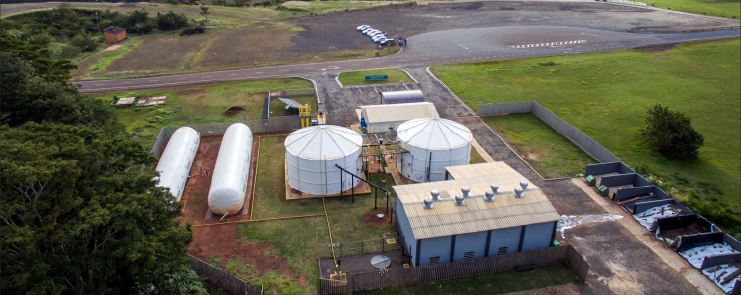Research, Development and Innovation
Itaipu Binational invests in research and innovation projects for the development of energy and technology that can be placed at the service of the company and society, with emphasis on renewable energy sources, and aiming at the sustainable development of its area of influence. All of its actions in this area are aligned with the Global Pact Principles and the Sustainable Development Objectives (ODS 7, 8, 9, 11 and 13). And, also in line with Brazil's commitment to reduce its greenhouse gas emissions by 43% by 2030, at the UN Climate Conference of 2015, COP 21.
Although there is no specific area of R&D+I in the Company, the commitment to the theme is part of the Business Plan, Fundamental Policies and Guidelines, Binational Policy of Sustainability and Sector Policy of Renewable Energies. In order to meet its Strategic Objective 11, Itaipu seeks to establish partnerships with national and international research and teaching institutes, to disseminate the technical and scientific knowledge produced within the Plant and share with other initiatives under development in the market.
Some of these initiatives are guided by the Itaipu Corporate University (UCI) with management of the interested areas and others are carried out decentrally by the organizational units through cooperation contracts and agreements.
Itaipu Technological Park Foundation (FPTI), an institution created and maintained 13 years ago by Binational to generate scientific knowledge, is Itaipu's main partner in research and innovation. The space gathers institutions of education and research governmental entities and companies of the private initiative. This model seeks the best use of resources invested in infrastructure, optimization and complementation of skills, through network operation.
Among the incentives for innovation, Itaipu conducts internal workshops to prospect new lines of research, focusing on the demand of employees for improvements in the plant's operational performance. In addition, it establishes partnerships with educational institutions to provide PhD, master and specialization courses in the scope of research projects.
This scientific and innovative environment is perceived from the physical presence in the Entity of courses from the University of the West of Paraná (UNIOESTE), the Institute of Applied Technology and Innovation (ITAI) and the Federal University of Latin American Integration (UNILA).
Areas of interest of Itaipu in R&D+I:
- Production of energy
- Transmission technologies
- Dam safety
- Modernization of the plant
- Environment
- Information technology
- Social technology
- Renewable energy technologies
- Sustainable electric mobility
Eureka Award!
Created in 2010, Eureka Award went through a review in 2017 that aims to broaden the possibilities of participation of employees interested in contributing with innovative ideas for the creation of new products and improvement of processes. Due to this revision, it was possible to institute a binational and universalized approach of the Award that will enable the integration and commitment of Brazilian and Paraguayan employees in 2018 to implement unique and shared solutions.

However, it is worth mentioning the result generated by the Expired Medicines – Renewed Resources project, awarded in 2016. The goal is to help people to give the correct destination for medicines not consumed before these expire. In only three months of operation in the Building Parigot de Souza, in Curitiba, seven kilos of medicines were collected that had adequate disposal. Every kilo of medicine incorrectly disposed of in the garbage or sewage network can affect 450,000 liters of water, so about 3,150 million liters of water were not contaminated.
Dam Security Advanced Research Center (Ceasb)
More than 700 hundred people trained in Dams’ Security
Ceasb of Itaipu Technological Park (PTI) has already trained more than 700 people in dams’ security, with 22 PhD. The Center develops research and solutions for plant safety, mainly for Itaipu Binational. The objective of these studies is to increase the understanding of the various phenomena involved in the dam and the turbines, helping to increase the safety and the useful life of these structures. The simulations, made in high-performance computers from Ceasb's laboratory, are based on data provided by Itaipu to promote the technological update of the hydroelectric plant. In 2018, Ceasb celebrates 10 years with the objective of expanding its operations in national and international partnerships.
Biomethane Production
In 2017, Itaipu and CIBiogás inaugurated a demonstration unit for biogas and biomethane installed in the plant with 100% national technology. The biogas generated from the treatment of organic waste from restaurants and the pruning of grass within the Plant is transformed into biomethane, which is used as biofuel to supply approximately 25% of the fleet (21 own vehicles). By 2020, the company intends to have replaced 50% of the fleet with electric vehicles or that run on biomethane.
The biomethane mobility projects aim to create alternatives for the use of biofuel, strengthening the entire biogas chain in the western region of Paraná, reducing greenhouse gas emissions, using traditional fuels and using biofertilizers in agriculture.

Itaipu entered into a technological cooperation agreement with the Italian tractor manufacturer New Holland to encourage the production of biomethane as vehicle fuel. The Company is responsible for the adaptation project of the Italian tractor powered by biomethane to the natural characteristics of Brazil. The property chosen to test the tractor in Brazil was Granja Haacke, in Santa Helena, which has an adequate structure and has been a partner of Itaipu since the beginning of the work with the production and use of biomethane in the production chain.
| Safety of dams | |||
|---|---|---|---|
| Objective | To develop computational intelligence techniques related to the behavior and safety of dams, through the Dam Safety Advanced Research Center (Ceasb), and applied research on the behavior of structures and their respective materials. | ||
| Investments | 2017: US$ 531.145,20 | 2016: US$ 572.842,12 | 2015: US$ 763.620,74 |
| Partners | Itaipu Technological Park Foundation (FPTI), Federal University of Paraná (UFPR), Electric Energy Research Center (Cepel), Paraná Sanitation Company (Sanepar). | ||
| Main result in 2017 | Development of the Itaipu Collectors System application, which assists in the recording and synchronization of the readings performed in the thousands of monitoring instruments (auscultation) of the Itaipu dam. | ||
| Transmission and distribution technologies | |||
|---|---|---|---|
| Objective | To conduct research, tests and verifications of the dynamic performance of equipment and systems associated to the generation, transmission and distribution of electricity in a real-time digital simulation platform at the Automation and Simulation of Electric Systems Laboratory (Lasse). | ||
| Investments | 2017: US$ 851.321,15 | 2016: US$ 819.446,20 | 2015: US$ 897.012,40 |
| Partners | Itaipu Technological Park Foundation (FPTI), School of Engineering of São Carlos of the University of São Paulo (EESC-USP). | ||
| Main result in 2017 | Development of a transformers monitoring system for web management and visualization of the transformers of generator units 9A and 18A. | ||
| Hydrogen Research | |||
|---|---|---|---|
| Objective | To develop studies at the Nucleus of Hydrogen Research (NUPHI) that allow Itaipu to, in the future, extract hydrogen from surplus water and energy. Stored in large cylinders in the form of gas, hydrogen can be used in fuel cells and produce electricity to power homes, industries and even electric vehicles. | ||
| Investments | 2017: US$ 172.624,20 | 2016: US$ 111.380,23 | 2015: US$ 52.725,78 |
| Partners | Itaipu Technological Park Foundation (FPTI), Eletrobras and the Benchmark National Hydrogen Energy Center of the State University of Campinas (Unicamp). | ||
| Main result in 2017 | Analysis of experimental work on the hydrogen life cycle, the energy efficiency of the installed plant and the use of hydrogen in fuel cells for auxiliary energy systems, the combustion of hydrogen-enriched biomethane and the development of new polymer membranes for fuel. | ||
| Hydroinformatics International Center | |||
|---|---|---|---|
| Objective | To improve the management of water resources with hydroinformatics solutions, promoting development and innovation, building capacities to use and disseminate them in the field of science and water. | ||
| Investments | 2017: US$ 322.109,74 | 2016: US$ 338.887,09 | 2015: US$ 752.128,80 |
| Partners | Itaipu Technological Park Foundation (IEPP), International Hydrological Program (IHP) of the United Nations Educational, Scientific and Cultural Organization (Unesco), the Latin American Energy Organization (Olade), the Federal Technological University do Paraná (UTFPR), National Water Agency (ANA) and National Institute of Space Research (INPE). | ||
| Main result in 2017 | Development and presentation of the Solar Energy Atlas of Paraná, as a tool to consult and analyze the potential of solar irradiation and photovoltaic electric energy generation in the state. The studies of water energy potential and forest biomass and animal residual in BP3 were also noteworthy. | ||
| [413-1] | Renewable Energy Platform | ||
|---|---|---|---|
| Objective | To disseminate the use of renewable energy sources and efficient energy technologies, with an emphasis on biogas, through the development of projects that create new business opportunities and provide energy autonomy for the agricultural and agroindustrial sectors, in parallel with an environmental sanitation process. | ||
| Investments | 2017: US$ 1.935.236,12 | 2016: US$ 1.898.828,97 | 2015: US$ 2.148.508,09 |
| Partners | International Center for Renewable Energies-Biogas (CIBiogás), Itaipu Technological Park (PTI), International Energy Agency (IEA), Federal Technological University of Paraná (UTFPR), Federal University of Paraná Foundation (Funpar), Brazilian Agricultural Research Corporation (SEBRAE / PR), OCEPAR System, Pontifical Catholic University of Rio Grande do Sul (PUC-RS) and cooperatives in the Western Region of Paraná (Embrapa-Florestas), and Small cooperatives of the West Region of Paraná. | ||
| Main resultin 2017 | Inauguration in June of the biogas and biomethane demonstration unit, installed in the Itaipu Binational area in Foz do Iguaçu (PR), and developed with 100% national technology. An average of 800 kilos per day of grass and 600 kilos per day of organic waste from restaurants are being processed, producing 4,500 m3 of biogas per month, used as biofuel to supply 71 vehicles powered by biomethane, which represent 25% of the fleet. The first edition of the Mercosur Biogas and Biomethane Report was also prepared, with success stories and information on the potential for the generation of energy from the biomass available in the four countries. | ||
New business opportunities with the use of renewable energies

| [413-1] | Electric Vehicle | ||
|---|---|---|---|
| Objective | To foster research and innovation in technology for the development of mobility solutions, and support initiatives for the development of clean and renewable energy sources, seeking energy efficiency and the sustainable development of the area of influence. | ||
| Investments | 2017: US$ 2.336.070,22 | 2016: US$ 1.425.278,46 | 2015: US$ 1.907.103,22 |
| Partners | Teaching and research entities, national and international public and private companies | ||
| Main resultin 2017 | The electric vehicle Intelligent Sharing System (SCI) project completed 1 year of operation and assisted Itaipu and PTI employees in transportation within the Brazilian margin of the plant. There are plans to install another 3 posts in 2018. Cooperation agreements are under way with the Brazilian army for the installation of an energy storage system in locations that are difficult to access or isolated. Completion of the Center for Innovation in Sustainable Electrical Mobility, with more than 3 thousand m2 distributed in laboratories, offices, tooling and showroom. The fleet of electric vehicles avoided the emission of 23.84 tons of CO and the 2 Electric Vehicle project generated approximately 367 spontaneous materials published in the external media during the year, saving investments estimated at BRL 2,581,000.00. | ||
Energy efficiency and sustainable development



 Brazil
Brazil
 Español
Español